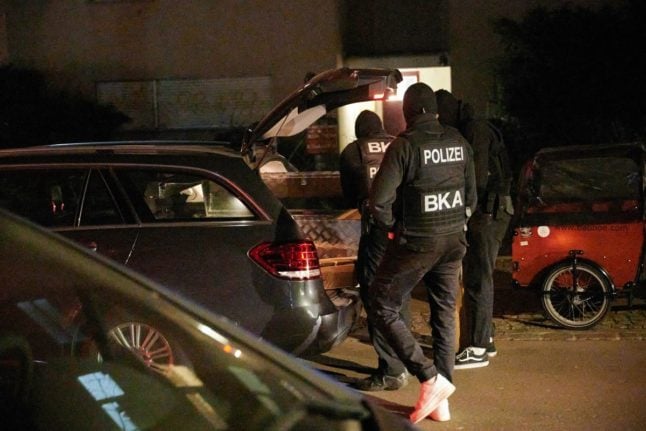According to the Police Crime Statistics (PKS) for 2023 published on Tuesday, crime rates rose across Germany last year.
In total, police recorded 5.94 million crimes nationwide in 2023, which is 5.5 percent more than in the previous year. Excluding violations of immigration law, crime was still up by 4.4 percent. In 2022, the crime rate had increased even more, by 11.5 percent compared to 2021 figures.
Statistically, crime rates are rising across the Bundesrepublik, but opinions vary as to the cause.
According to the Federal Criminal Police Office (BKA), there are three significant factors to consider: the aftermath of Covid, high inflation, and rapid immigration.
How does immigration affect the crime rate?
For politicians who campaign on anti-immigration policies, the 2023 crime statistics offer ample opportunity to blame foreigners and immigrants. For example, Bavaria’s Interior Minister Joachim Herrmann (CSU) had cited immigration as the main reason for the increased number of crimes in his state before the report was published.
When violations of immigration law are omitted, non-German citizens were suspected in 34.4 percent of the crimes recorded in 2023.
That may at first appear to be a disproportionate crime rate, considering that foreign nationals make up just 16.5 percent of Germany’s population. But there is some important context to consider.
The crime statistics also include people without a residence permit, tourists, visitors, border commuters and foreign military personnel who are not part of Germany’s population. So not all of the ‘foreigners’ included in the crime statistics are foreign residents living in Germany.
Studies have shown that people are more likely to report a crime if they suspect that the alleged perpetrator is a foreigner.
Additionally, the BKA notes that rapid immigration, as was seen in 2022 and 2023 in part due to Russia’s war in Ukraine, creates difficult living situations for asylum seekers in initial reception centres.
Risk factors such as economic insecurity and experiences of violence occur much more frequently among asylum seekers and refugees, BKA President Holger Münch told DPA.
How Covid restrictions affected the crime rate
Three years after they began, Covid restrictions likely had a strong effect on 2023’s crime statistics.
Social restrictions in 2020 and 2021, caused crime rates to dip significantly during those years. With the number of public events returning to normal during 2022 and 2023, crime rates rebounded as opportunities arose.
While the crime rate has risen significantly compared with 2020 or 2021, it is not a record breaking figure for Germany – the total number of crimes committed last year was comparable to 2016 figures.
The BKA also points to studies that suggest stress from school and university closures have had negative psychological effects on young people that remain after the end of government measures.
The crime rate and poverty rate are related
Economic insecurity is also a known driver of crimes, and one that may be influencing Germany’s crime statistics.
The BKA suggests that social and economic burdens, which were exacerbated by inflation in 2022 and 2023, lead to an increase in crime. The report found that the number of crime suspects tends to be higher in economically weaker regions.
On Wednesday, Germany’s statistical office (Destatis) published figures that confirmed more than 20 percent of the German population is at risk of poverty.
READ ALSO: ‘No job, no money’ – How German immigration office delays hurt lives of foreign workers
The link between poverty and certain types of crimes, such as petty theft, is obvious. But research has linked financial insecurity with an increase in all kinds of crimes.
Are police crime statistics really relevant?
According to reporting by ZDF, Kiel criminologist Martin Thüne suggests police crime statistics (PKS) in their current form should be abolished entirely.
Thüne suggests that the way these statistics are presented is problematic, and therefore he advocates for “radically questioning this PKS system, sitting down and developing something new.”
One example of how these statistics can be misleading is seen in the number of violent crime reports, which have tended to increase in recent decades, according to police statistics.
But Tobias Singelnstein, a Professor of Criminal Law at Goethe University Frankfurt, suggests the uptick in violent crime stats has more to do with higher reporting rates. Singelnstein told ZDF: “We as a society are becoming more sensitive to violence, [so] such acts are more ostracised than before.”
Interior Minister Nancy Faeser (SPD), who presented the PKS report on Tuesday emphasised: “Germany continues to be one of the safest countries in the world.”
READ ALSO: EU plagued by hundreds of dangerous crime gangs – Europol report
With reporting by DPA




 Please whitelist us to continue reading.
Please whitelist us to continue reading.
I wish someone would show the crime per capita. I keep seeing that it is at a 15 year high, but if the population is also 5% bigger than 15 years ago, what does it really mean? So a percent increase per capita is more help than a overall percent increase in number of cases.
I agree Corey! These statistics can be misleading – that’s why we wanted to unpack them a bit here. I also haven’t seen per capita figures. But according to the police report the last time the total number was this high was 2016. According to Destatis, Germany’s population has grown by about 2 million since then, so it seems like in per capita figures the rate would be pretty similar, if not slightly decreased since then. Thanks for calling that out, it’s certainly worth keeping in mind.